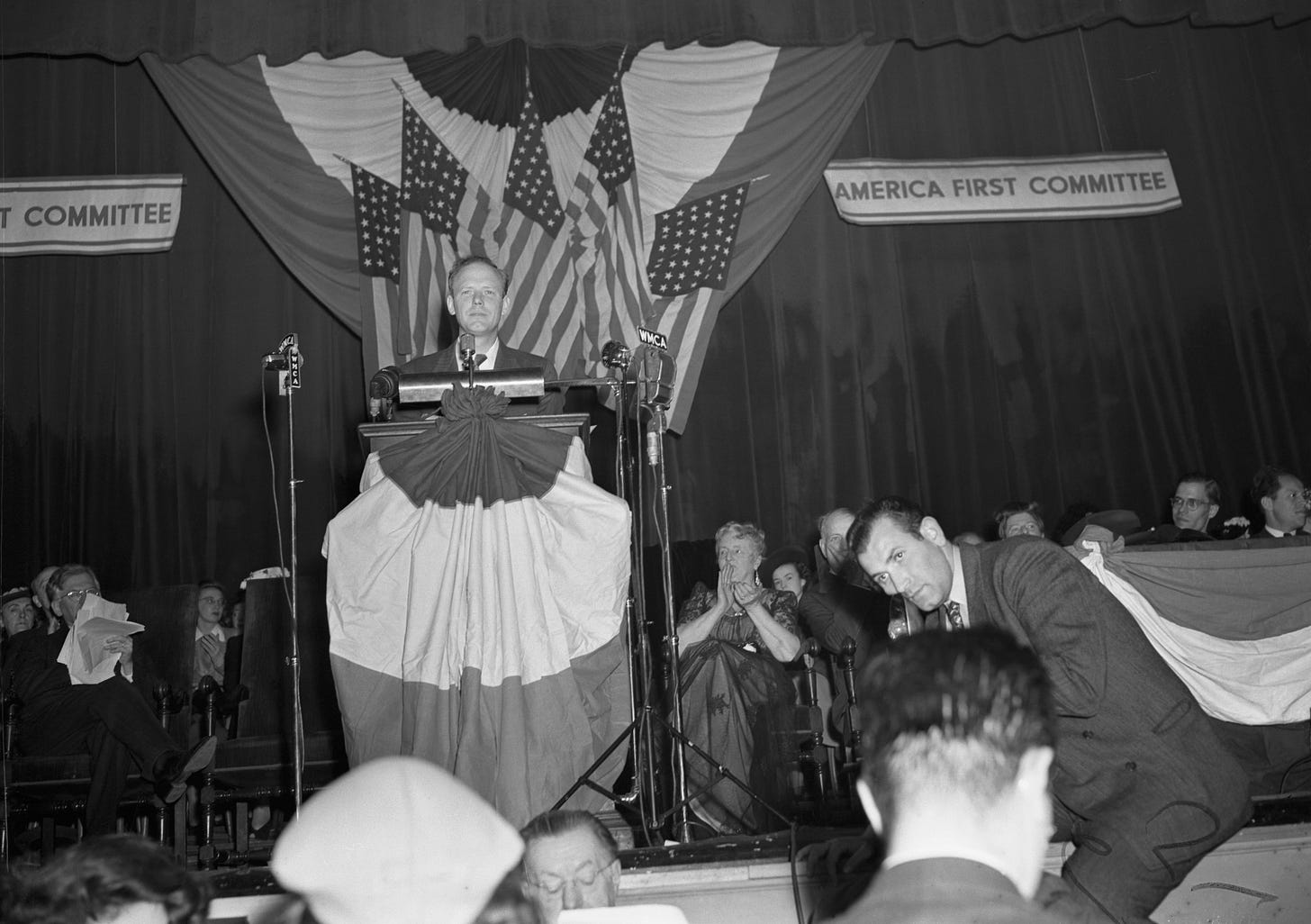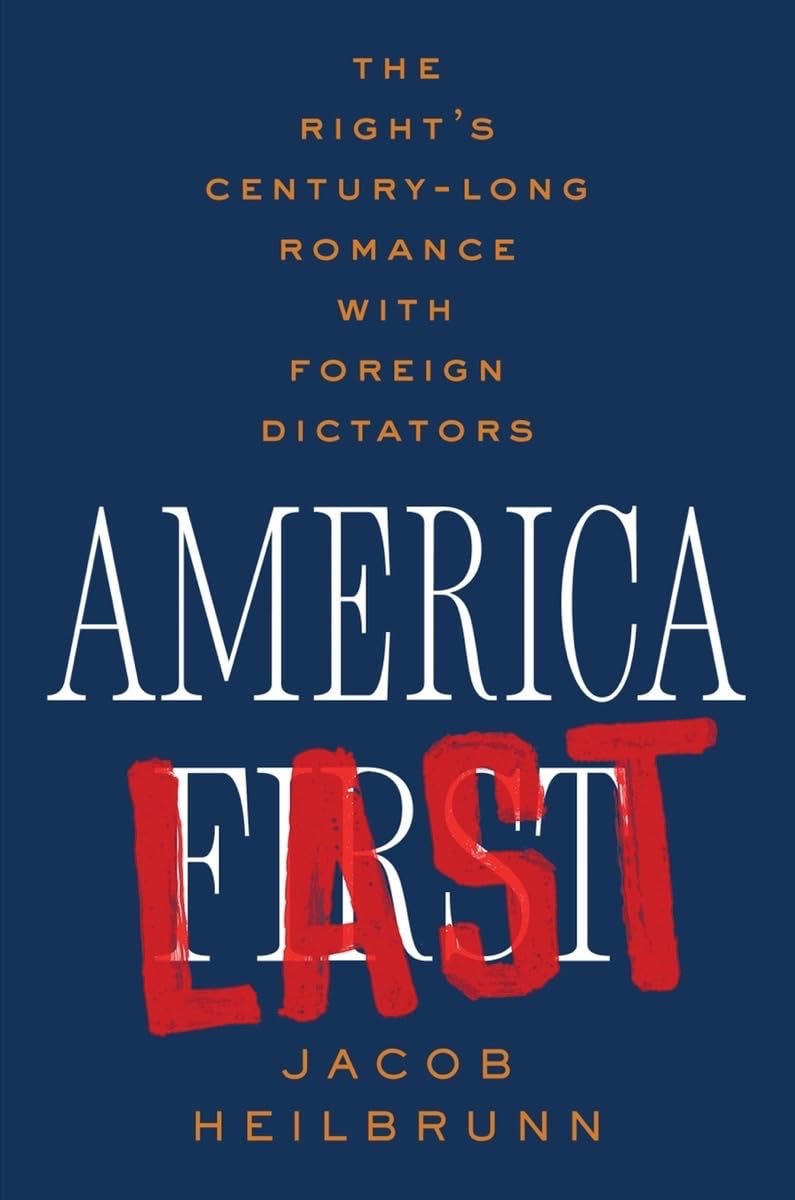A Low, Dishonorable Tradition
A review of Jacob Heilbrunn's "America Last: The Right’s Century-Long Romance With Foreign Dictators."
Author Jacob Heilbrunn couldn’t have asked for better timing for the release of his slim new polemic, America Last: The Right’s Century-Long Romance With Foreign Dictators.
It’s as if all-but-certain Republican presidential nominee Donald Trump, House Speaker Mike Johnson (R-LA), and right-wing media personality Tucker Carlson all conspired to ensure Heilbrunn’s book about the history of dictator worship and autocracy curiosity on the American right would be as timely as possible. Though detailed political analysis and historical exegesis isn’t the book’s strength, America Last does an enormous service in showing that Trump, Carlson, and their ilk aren’t aberrations—they’re just the latest specimens of a long and ignoble lineage in American politics and foreign policy.
Consider that in February 2024 alone, Speaker Johnson scuttled bipartisan legislation to secure America’s southern border and provide military aid to Israel and Ukraine—and then refused to bring separate legislation on aid to Israel and Ukraine to a vote. Meanwhile, ammunition shortages brought about by a lack of American support forced Ukrainian troops to withdraw from the town of Avdiivka. At the same time, candidate Trump once again made clear he views the NATO alliance as a protection racket and would “encourage [Russia] to do whatever the hell they want” if America’s allies did not pay their non-existent “bills.” For his part, Tucker Carlson made a pilgrimage to Moscow to interview Vladimir Putin and tout cheap Russian groceries.
As America Last makes clear, the actions make Trump and his fellow travelers the direct heirs of a dishonorable but enduring political tradition that stretches back more than a century, one complete with a cast of colorful—and sometimes borderline treasonous—characters. “Aggrieved, or at least disappointed,” Heilbrunn argues, “by what they perceived as their own society’s grievous failings—its liberalism, its tolerance, its increasing secularism—conservatives have searched for a paradise abroad that can serve as a model at home.”
That search began even before the First World War, when figures like writer George Sylvester Viereck and the legendary satirist H.L. Mencken promoted Imperial Germany’s cause and pioneered both the style and substance of the apologetics still heard in Vladimir Putin’s echo chambers on the modern right. Heilbrunn sums it up:
Mencken and Viereck engaged in whataboutism, scorned Western liberalism as a bankrupt ideology, and elevated authoritarianism above democracy. Instead of forcing it to capitulate on the battlefield and instead of trying to force it to adopt debased and corrupt Western liberal values, they suggested that America and Great Britain should have accommodated Germany’s wholly legitimate aspiration to safeguard its own unique, anti-Western culture.
Mencken was an erudite literary troll who made a pilgrimage to Germany during the war (albeit before America joined the fight) and would later pine for an “intelligent Fascism,” while Viereck happily worked with the kaiser’s spies to churn out pro-German propaganda. Differences in style and technique aside, Heilbrunn rightly sees both men as founders of a distinct right-wing political and foreign policy tradition that admires dictators abroad and, wittingly or not, seeks to serve their interests at America’s expense.
Despite Germany’s defeat in the war, Mencken and Viereck persisted in their campaign on behalf of the kaiser. Their claims echoed by disillusioned progressives like Walter Lippmann and Charles Beard, Mencken and similar figures did their part to help lay the foundation for the fashionable revisionism about American intervention in World War I that swept the nation’s political classes in the 1920s and 1930s—much in the same way notions of “restraint” took hold in the wake of the Iraq war. Then as now, voices on both left and right fought to keep America out of the last war as new threats emerged on the global stage.
When it comes to the most acute of those threats—the rise of fascism in Europe—Heilbrunn looks beyond Charles Lindbergh to focus on some of the isolationist right’s more obscure personalities. Stranger still was the case of Lawrence Dennis, a mixed-race former diplomat who later advised Lindbergh and called Hitler “not only the greatest political genius since Napoleon but also the most rational.” Dennis wrote for fascist periodicals and even attended the Nazi Party’s annual Nuremberg rally in 1936, after which he met with Viereck—still active in Berlin’s service—and Nazi diplomat Heribert von Stempel “to discuss future activities on behalf of Nazi Germany.”
Viereck himself was already on Nazi Germany’s payroll, sending political reports back to Berlin, writing for and editing isolationist magazines, and cranking out anti-British propaganda. After the outbreak of war in 1939, Viereck began publishing isolationist tracts himself (he even ghostwrote one for an Illinois Republican) and lobbying Congress. He cultivated a rogue’s gallery of isolationist lawmakers like Rep. Hamilton Fish (R-NY) and Sen. Burton K. Wheeler (D-MT), using them to inject Nazi propaganda into America’s political debates and taking advantage of their free official mail privileges to distribute it around the country.
Even without Viereck’s energetic efforts on behalf of the Third Reich, a general sympathy for Hitler prevailed on the isolationist right—the Nazi dictator, after all, “crushed labor unions, supported big business, and espoused martial values.” Matters came to a head at the Republican convention in 1940, where former president Herbert Hoover blasted current President Franklin D. Roosevelt’s vocal opposition to Hitler and Rep. Fish mounted a failed attempt to insert isolationist language into the GOP platform. Though internationalist businessman Wendell Willkie won the party’s presidential nomination, isolationism and dictator worship persisted on the American right past the convention and even after World War II.
Indeed, the war failed to discredit the isolationist right in the way many Americans once assumed. After the war, some conservative isolationists tried to push revisionist accounts of America’s intervention in the Second World War akin to those offered after the First World War, but by and large these attempts failed to take root. Instead, many on the right demanded U.S. foreign policy focus on fighting communism Asia first—not defending a decadent and freeloading Europe. It’s not hard to hear the echo of these earlier arguments in contemporary calls from some on the right to abandon Ukraine to Russia in order to prepare for a hypothetical war with China over Taiwan.
From Spain’s Francisco Franco and Chile’s Augusto Pinochet to South Africa’s apartheid government and warlords like Angola’s Jonas Savimbi, moreover, a number of significant figures on the right fell hard for a wide range of anti-communist dictators and regimes around the world during the Cold War. As Heilbrunn makes clear, the American right’s affinity for this crop of strongmen had less to do with realpolitik—a series of otherwise regrettable moral compromises necessary to contain and counter Soviet communism—than with an attraction to autocrats in and of themselves. L. Brent Bozell, in-law and comrade of National Review founder William F. Buckley, Jr., visited Franco’s Spain in the early 1960s, for instance, and zealously advocated for Catholic integralism, an ideology beloved by some of the leading intellectual lights of today’s post-liberal right.
With the fall of the Berlin Wall in 1989 and demise of the Soviet Union two years later, the right’s ignoble isolationist tradition reemerged with former GOP staffer and presidential candidate Pat Buchanan as its tribune. Buchanan repackaged this tradition’s perennial themes about American intervention in the world wars for the post-Cold War era, claiming that FDR and his liberal elites “had seized upon World War II to transform America into the world’s policeman”—a claim echoed by some advocates of “restraint” today. He likewise toed the Kremlin’s foreign policy line and opposed American involvement in the Balkan wars of the 1990s.
Still, this conservative isolationist tradition did not become dominant among Republicans until Donald Trump seized the party’s nomination for president in 2016. Though they likely constitute a majority, at least among elected Republicans, conservative internationalists find themselves fighting a losing rearguard battle against Trump and his acolytes. Despite his own strong support for military aid to Ukraine, for instance, Sen. Mitch McConnell (R-KY) now appears to be in talks to endorse Trump’s 2024 bid for the White House. It’s hard to recall a more thorough political capitulation, much less one so damaging to American national interests.
But as Heilbrunn reminds us in America Last, Trump and his enablers are simply the latest representatives of an enduring conservative isolationist tradition—one that holds America as it actually exists in contempt, and one that many Americans erroneously thought had been consigned to the fringes of national politics after the Second World War. Trump and his movement aren’t merely this tradition’s heirs; they represent its culmination.
If nothing else, Heilbrunn’s accessible polemic helps us see this reality more clearly.




